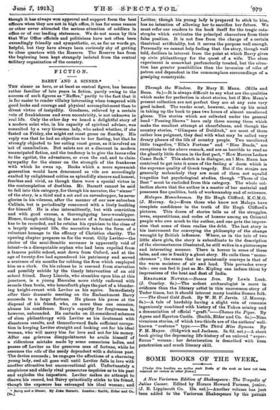FICTION.
BARRY AND A SINNER.*
THE sinner as hero, or at least as central figure, has become .rather familiar of late years in fiction, partly owing to the success of such figures as "Raffles," partly to the fact that it is far easier to render villainy interesting when tempered with good looks and courage and physical accomplishment than to divest virtue of insipidity. Goodness, relieved by a certain 'vein of freakishness and even eccentricity, is not unknown in 'real life. Only the other day we heard a delightful story of
modern saint who, in his capacity of spiritual adviser, was consulted by a very tiresome lady, who asked whether, if she lasted on Friday, she might eat roast goose on Sunday. His reply was that he had no objection to her fasting, but that he strongly objected to her eating roast goose, as it involved an act of cannibalism. But saints are at a discount in modern 'emancipated fiction, and the tendency is to give the beaux roles to the egotist, the adventurer, or even the cad, and to claim sympathy for the sinner on the strength of the frankness with which he owns up. Books which a more squeamish generation would have denounced as vile are accordingly exalted by enlightened critics as splendidly sincere and honest, fearless and vivid, as though there were a special virtue in the contemplation of dustbins. Mr. Barnett cannot be said to fall into this category, for though his narrator, the " sinner " of the story, is a thief and a sot and an eavesdropper, be never glories in his vileness, after the manner of our new suburban Cellinis, but is periodically consumed with a lively loathing for himself. He is also intermittently, but with conviction and with good excuse, a thoroughgoing hero-worshipper. Hence, though nothing in the nature of a formal conversion has to be recorded, and he retains his cynicism to the close of a largely misspent life, the narrative takes the form of a reluctant homage to the efficacy of Christian charity. The opening chapter prepares us for the worst. Gilly Leviter—the choice of the semi-Semitic surname is apparently void of intent—is a disreputable orphan who had been expelled from a famous public school, sent down from Oxford, and at the age of twenty-five had squandered his patrimony and served a sentence of six months for robbing the firm which employed him as a clerk. On his release he is rescued from starvation and possibly suicide by the timely intervention' of an old school friend. Barry Lincoln, whO stumbles upon him at this juncture, is a young Hercules more richly endowed with muscle than brain, who henceforth plays the part of a blunder- ing knight-errant with Leviter as his squire. Immediately after their dramatic meeting on the Embankment Barry succeeds to a large fortune. He places his purse at the disposal of his friend, who, on more than one occasion, abuses his confidence. Barry's capacity for forgiveness is, however, unbounded. He embarks on ill-considered schemes of slum philanthropy with Leviter as his lieutenant with disastrous results, and thenceforward finds sufficient occupa- tion in keeping Leviter straight and looking out for his ideal woman, who will marry him for love and not for his money. After one grievous disappointment he avails himself of a ridiculous mistake made by some censorious ladies, and passes off Leviter as the generous man of fortune, while he assumes the role of the needy dependent with a dubious past.
The device succeeds ; engages the affections of a charming young lady, and all goes well until Leviter falls in love with another attractive but unconventional girl. Unfortunately a suspicious and elderly rival prosecutes inquiries as' to his past and explodes the imposture. Leviter males no attempt to disown his record, but Barry quixotkally sticks to his friend, • though the exposure has estranged his ideal woman; and
' Barry and a-Sinner. BY deka Barnett. Lendon: Smith; Elder and Co.. C6s.]
Leiiter, though his young lady is 'prepared to stick to him, has no intention of allowing her to sacrifice her future. Wo must refer our readers to the book itself for the tragic cata- strophe which extricates the principal characters from their false position. It is not free from the charge of a certain theatrical artificiality, but it serves the purpose well enough. Personally we cannot help feeling that the story, though well told, declines in interest from the point at which Barry gives up civic philanthropy for the quest of a wife. The slum experiment is somewhat perfunctorily treated, but the situa- tion has greater possibilities than the inversion of roles of patron and dependent in the commonplace surroundings of a gossiping countryside.














































 Previous page
Previous page